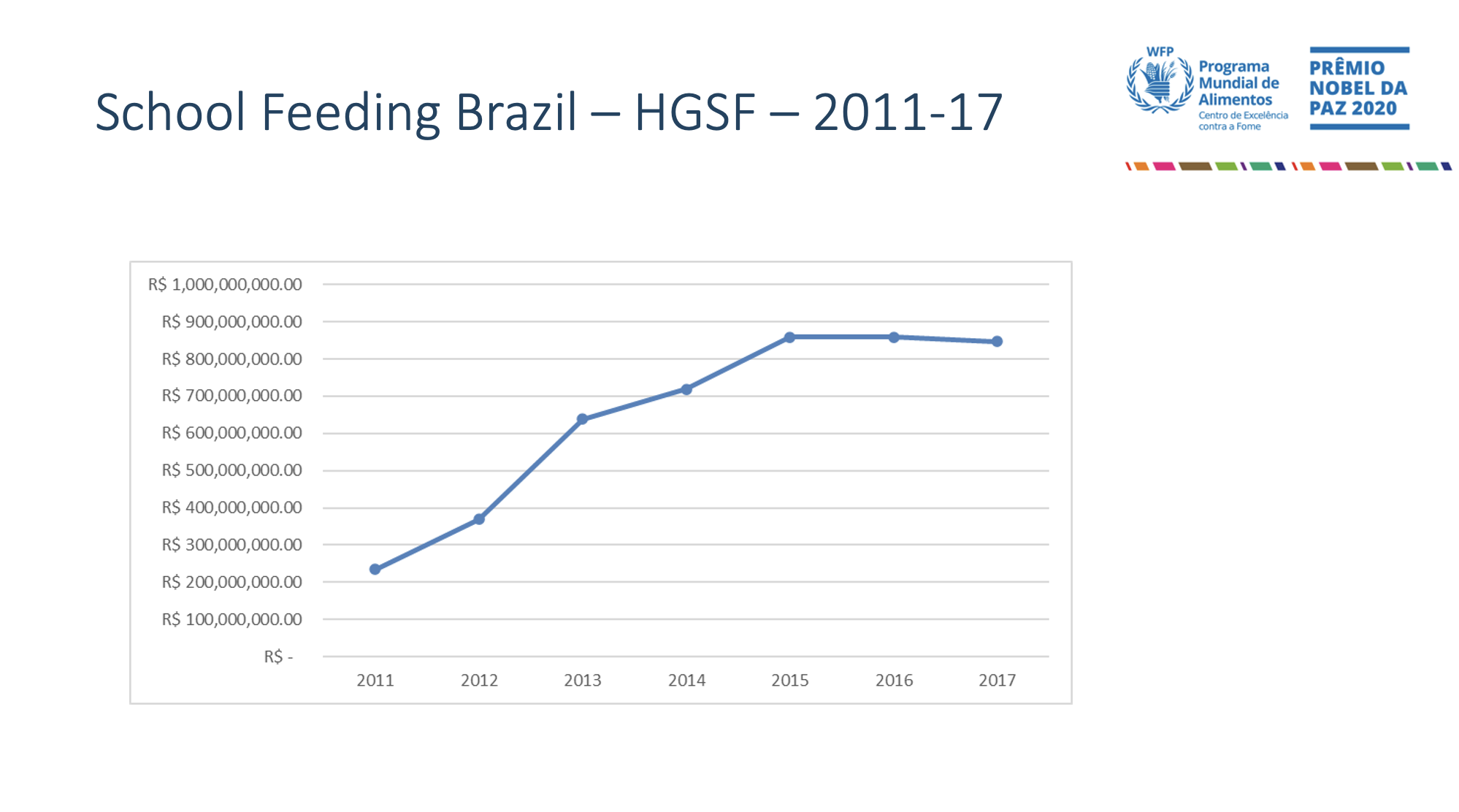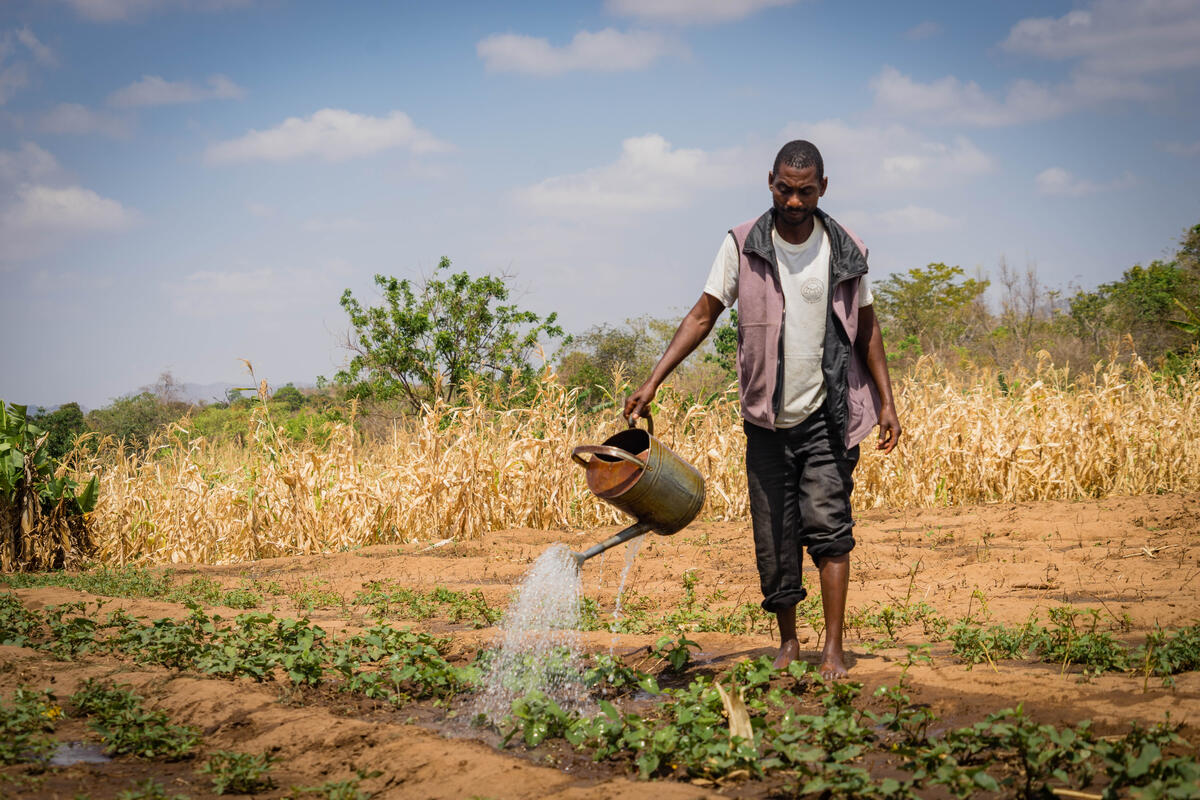 Namibia is designing its 6th National Development Plan and looking to transition the current school feeding model into a home-grown school feeding (HGSF) programme. WFP in Namibia is supporting national stakeholders to design programmes that strengthen food systems and invited the academia, national and sub-national government representatives to its quarterly review meeting for 2021, which took place in Zambezi. As part of the mandate of the WFP Centre of Excellence against Hunger, a group of specialists from the Centre took part in an online session with Namibia on Wednesday 28th April 2021 to discuss mechanisms to transform rural economies based on the Brazilian experience. Participants in this meeting included: WFP Namibia staff; Ministry of Education, Arts and Culture; Office of the Prime-Minister; Representatives of sister UN Agencies (FAO and UNFPA); as well as senior officials from three regional governments. Additionally, 17 young professionals working at the Namibia University of Science and Technology (NUST) took part in the meeting.
Namibia is designing its 6th National Development Plan and looking to transition the current school feeding model into a home-grown school feeding (HGSF) programme. WFP in Namibia is supporting national stakeholders to design programmes that strengthen food systems and invited the academia, national and sub-national government representatives to its quarterly review meeting for 2021, which took place in Zambezi. As part of the mandate of the WFP Centre of Excellence against Hunger, a group of specialists from the Centre took part in an online session with Namibia on Wednesday 28th April 2021 to discuss mechanisms to transform rural economies based on the Brazilian experience. Participants in this meeting included: WFP Namibia staff; Ministry of Education, Arts and Culture; Office of the Prime-Minister; Representatives of sister UN Agencies (FAO and UNFPA); as well as senior officials from three regional governments. Additionally, 17 young professionals working at the Namibia University of Science and Technology (NUST) took part in the meeting.
The meeting between WFP Namibia and the WFP CoE aimed at presenting the role of home-grown school feeding in contributing to rural transformation using the Brazilian model. The session also highlighted the role of HGSF as a catalyst of smallholder farming production and other outcomes including education and nutrition. It was part of a week-long series of events in the Zambezi region which included a quarterly review exercise and a farmer’s market day intended to promote and expose smallholder farmers to learning opportunities and potential markets. Representing the WFP Centre of Excellence were Sharon Freitas, Head of Programme; Igor Carneiro, Senior Programme Officer; Joelcio Carvalho, Project Officer; and Vinicius Limongi, Programme Assistant.
“The challenges involved in the implementation of a school feeding programme in a country as large as Brazil could serve as an inspiration to other nations”, said Sharon Freitas. HGSF represents a wide-ranging system of institutions, financing schemes, partners and planning processes that goes beyond simply having school gardens or purchasing fresh food from local farmers. “Namibia is shifting from its traditional School Feeding programme into a Home-Grown School Feeding model and we believe that the Brazilian experience over the past few decades can help the country leapfrog many challenges in this process”, said Igor Carneiro at the start of the session. “Brazil has managed to lift millions of people from extreme poverty with this approach and we believe it may also help Namibia”.

Joelcio Carvalho was the first to present. He highlighted the importance of the link between local agriculture and school feeding programmes and described the Brazilian journey in HGSF, especially the norm that requires that 30% of food purchases for school feeding come from smallholder farmers. This means that school meals can be more balanced, nutritious and can contain fresher foods. Also, it allows schools to choose what they want to buy for a better price, and farmers can be paid a fairer amount, since there will be no intermediaries in the process.
Then, Vinicius Limongi detailed how public policies implemented in Brazil throughout the years helped shape the Brazilian National School Feeding Programme, known as PNAE. He explained the Brazilian journey in including farmers in public policies such as PAA (Food Acquisition Programme) and the Cisterns Programme. He also highlighted some of the key features of PNAE, such as nutritional standards, the prioritization of shorter logistics circuits and the participation of nutritionists in the process of menus design. In addition, PNAE also determines that menus should respect local eating habits. “Cooks, school principals, and nutritionists have been receiving training to be ready to meet these goals, which will ultimately benefit children’s nutrition”, said Vinicius Limongi.
Following this session, technical teams from the WFP Centre of Excellence will continue to collaborate with the WFP in Namibia and local government representatives to assist in the design of programmes and policies in the country to strengthen the food systems approach. With the assistance of the WFP Centre of Excellence, WFP in Namibia is looking to benefit from the gains that Brazil has made over the years in transforming its agricultural sector, to draw lessons from Brazil’s home grown school feeding programme model and to engage in a South-South Cooperation exercise which will enable the transfer of knowledge in various areas.
To learn more about the work of the WFP Centre of Excellence, please visit our page.




